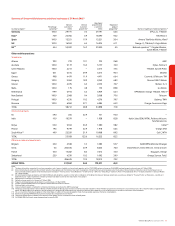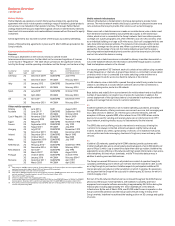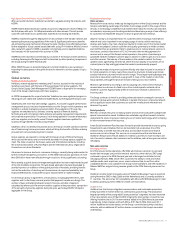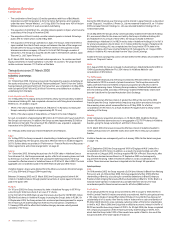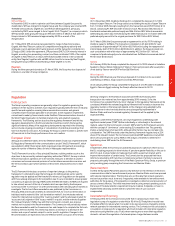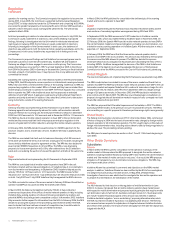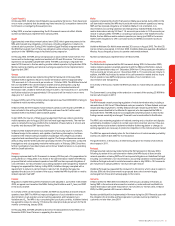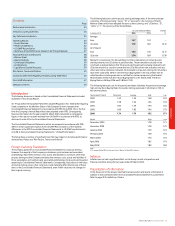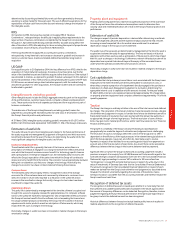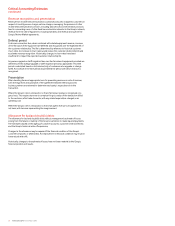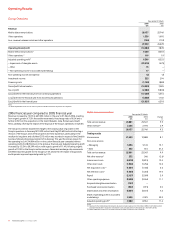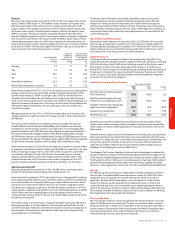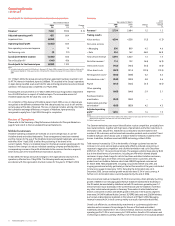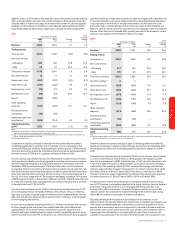Vodafone 2006 Annual Report Download - page 25
Download and view the complete annual report
Please find page 25 of the 2006 Vodafone annual report below. You can navigate through the pages in the report by either clicking on the pages listed below, or by using the keyword search tool below to find specific information within the annual report.
Vodafone Group Plc Annual Report 2006 23
Czech Republic
In February 2005, Vodafone Czech Republic was awarded a 3G licence. There have been
one or more complaints that the award may have breached EU competition law and the
Commission is investigating the award process.
In May 2005, a new law implementing the EU Framework came into effect. Mobile
number portability was implemented in January 2006.
Egypt
Egypt enacted a new telecommunications law in 2003, which gave new powers to the
NRA and imposed new obligations on licensees, including obligations in relation to
universal service provision. During 2004, Vodafone Egypt finalised an agreement with
the NRA that covered most of these new obligations while obtaining additional
spectrum in the 1800MHz range to facilitate business expansion.
In February 2005, the NRA announced proposals to award a third mobile licence. The
licence will be technology neutral and enable both 2G and 3G services. The licence is
expected to be awarded by September 2006. The NRA is planning to negotiate the
award of 3G licences to the two existing mobile network operators by September 2006.
Mobile number portability and national roaming are expected to be implemented in
Egypt by April 2007.
Greece
Greece enacted national law implementing the EU Framework in February 2006.
Vodafone Greece agreed to reduce its mobile termination rate from approximately
17.0 eurocents to 14.5 eurocents per minute on 1 October 2004. The NRA has found all
firms to have SMP in the call termination market and has developed a Long Run
Incremental Cost model (“LRIC model”) to determine cost oriented mobile call
termination rates. Vodafone Greece will reduce its rate to 12.0 eurocents on 1 June 2006
and further reductions to approximately 10.0 eurocents will be made in one or more
steps prior to 1 June 2007.
In August 2005, each of the mobile network operators was fined 500,000 for failing to
implement mobile number portability.
In March 2006, the three largest mobile network operators were found by the NRA to
have colluded in the setting of retail SMS prices and were fined 1 million each.
Vodafone Greece has filed an administrative appeal.
In April 2005, the Council of State issued a judgement that base stations erected by
mobile operators prior to August 2002 did not meet legal requirements. The new law
seeks to remedy this but also prohibits the installation of base stations in schools and
hospitals and decreases EMF exposure limits.
In March 2005, Vodafone Greece was made aware of a security issue in its network.
Software foreign to the network, and capable of performing interception, had been
installed in the network without Vodafone’s knowledge. The software was created,
supported and maintained by an external supplier. The foreign software was removed
without delay and the Greek authorities promptly informed. The authorities conducted
investigations and subsequently made the matter public in February 2006. Since then,
further investigations have taken place and continue. Vodafone Greece is co-operating
with the Greek authorities.
Hungary
Hungary implemented the EU Framework in January 2004 as part of its preparations for
joining the EU on 1 May 2004. In its review of the call termination market, the NRA has
proposed that all mobile network operators have SMP and has imposed obligations of
cost orientation, non-discrimination, accounting separation and transparency. Vodafone
Hungary has appealed this finding. In May 2005, Vodafone Hungary complied with a
requirement to reduce its call termination rates by 16%. Vodafone Hungary has
appealed the decision. In its review of the access market the NRA found that no mobile
network operator had SMP.
Ireland
Regulations implementing the EU Framework were adopted in June 2003. In December
2005, an appeal court annulled the NRA’s finding that Vodafone and O2have joint SMP
in the access market.
In its review of the call termination market, the NRA has found that all mobile network
operators have SMP. The NRA has imposed obligations of cost orientation and non-
discrimination on all operators and accounting separation and transparency on
Vodafone and O2. The NRA is also considering the use of price controls. Vodafone Ireland
has agreed to reduce its rates by 11% below the retail price index per annum for the 24
months commencing January 2006.
In February 2006, the NRA withdrew a 3G licence it had awarded to Smart Telecom in
November 2005. Smart Telecom is appealing this decision.
Malta
Legislation implementing the EU Framework in Malta was enacted during 2004. In the
call termination market, the NRA has found both mobile network operators as having
SMP and has imposed obligations on Vodafone Malta of cost orientation, non-
discrimination, accounting separation and transparency. Vodafone Malta reduced its
mobile termination rates by 5% from 11.5 eurocents per minute to 10.9 eurocents per
minute in January 2006. The NRA is consulting on proposals to find Vodafone and Go
Mobile, the two Maltese mobile network operators, as having joint SMP in the access
market, with obligations to offer cost based access to MVNOs and indirect access to
other parties.
Vodafone Malta and Go Mobile were awarded 3G licences in August 2005. The third 3G
licence remains unassigned. In October 2005, Vodafone Malta was awarded a Broadband
Wireless Access frequency licence to operate a nationwide network.
Number portability was implemented on 31 March 2006.
The Netherlands
The Netherlands implemented the EU Framework during 2004. In December 2003,
mobile network operators reached agreement with the NRA and the NCA to reduce
mobile call termination rates on 1 December 2004 from 15.4 eurocents per minute to
13.0 eurocents per minute, and on 1 December 2005 to 11.0 eurocents per minute. In
addition, the NRA has finalised its review of the call termination market and has found
that all operators have SMP and proposes remedies of cost orientation, non-
discrimination and transparency.
In its review of the access market, the NRA found that no mobile network operator had
SMP.
The Government is consulting on the extension or renewal of the existing 2G 900 MHz
licences which expire in 2010.
New Zealand
The NRA released a report proposing regulation of mobile termination rates, including a
rate reduction of 44% from 27 New Zealand cents per minute to 15 New Zealand cents per
minute and reducing further to 12 New Zealand cents per minute by 2010/2011. These
proposals were submitted to the Minister for approval, who has requested the NRA to
reconsider them. The NRA has done so and published a further position in which its key
findings remain essentially unchanged. These will now be resubmitted to the Minister.
The NRA is also reviewing regulation of national roaming and co-location and disputes
submitted by Vodafone in relation to certain local interconnection services. It has also
recently announced a review to determine whether further regulation or changes to
existing regulation are necessary to promote competition in the mobile services market.
The NRA has approved industry plans for the introduction of mobile number portability
and has set a date of April 2007 for its introduction.
The government is in the process of determining the price for renewal of 2G licences
which expire in 2011.
Portugal
Portugal enacted national law implementing the EU Framework in February 2004.
Following its review of the call termination market, the NRA found all three mobile
network operators as having SMP and it has imposed obligations on Vodafone Portugal
including cost orientation, non-discrimination, accounting separation and transparency.
Vodafone Portugal reduced its mobile termination rates in July 2005 to 13.0 eurocents
per minute and in January 2006 to 12.5 eurocents per minute.
Vodafone Portugal has requested the renewal of its 2G licence, which is due to expire in
October 2006, and the Government has proposed terms which remain largely
unchanged from those which already apply to the licence.
Romania
In March 2003, the NRA determined MobiFon, the Group’s subsidiary in Romania, as
having SMP in the national interconnection market so, under national law, MobiFon’s
mobile termination rates were reduced from 12.0 US cents to 10.0 US cents. In March
2005, the NRA granted a 3G licence to MobiFon.
Number portability will be implemented in Romania during the 2007 financial year, with
the obligation for all mobile and fixed operators to provide number portability to
customers no later than June 2007.
Business


